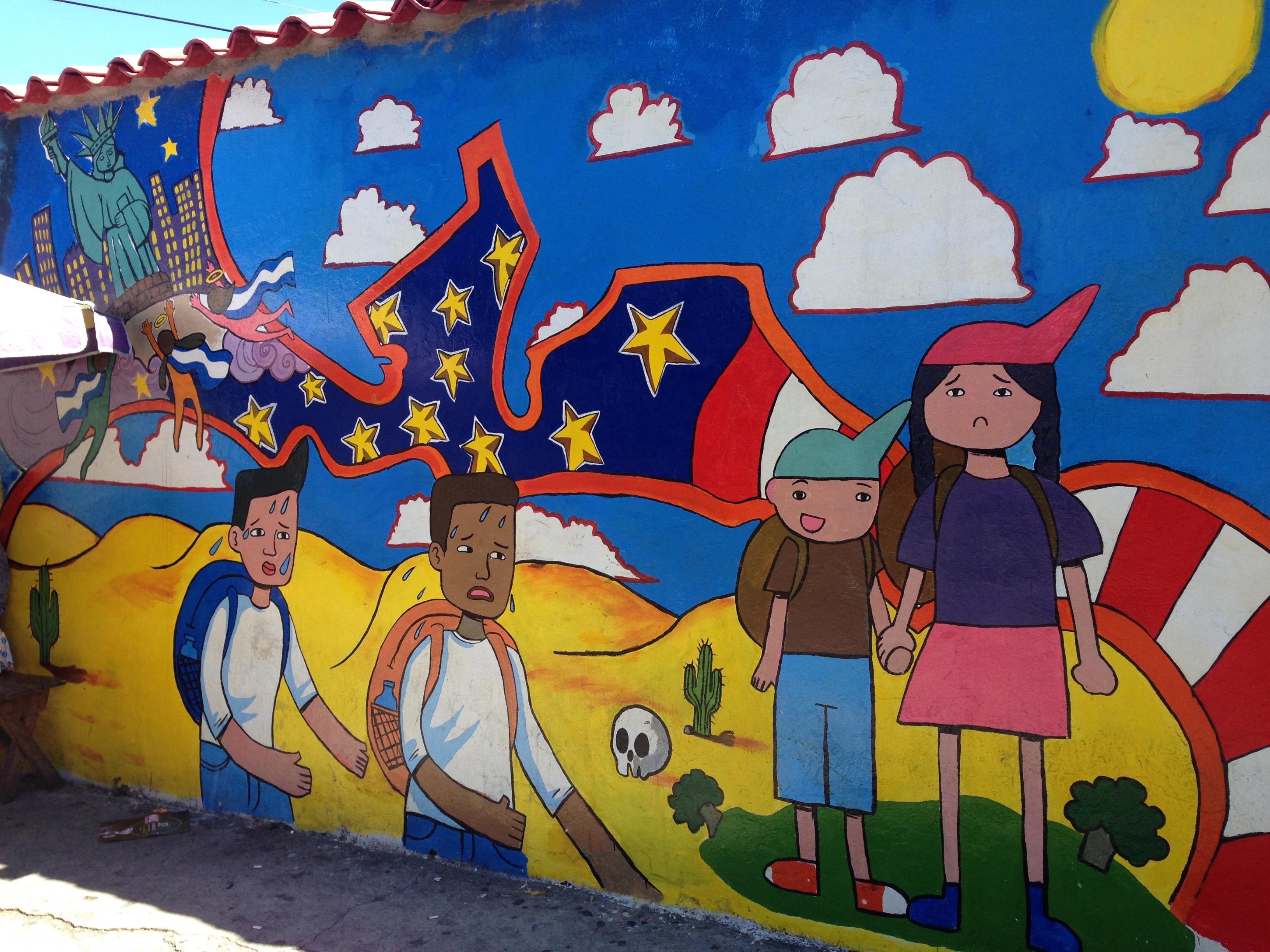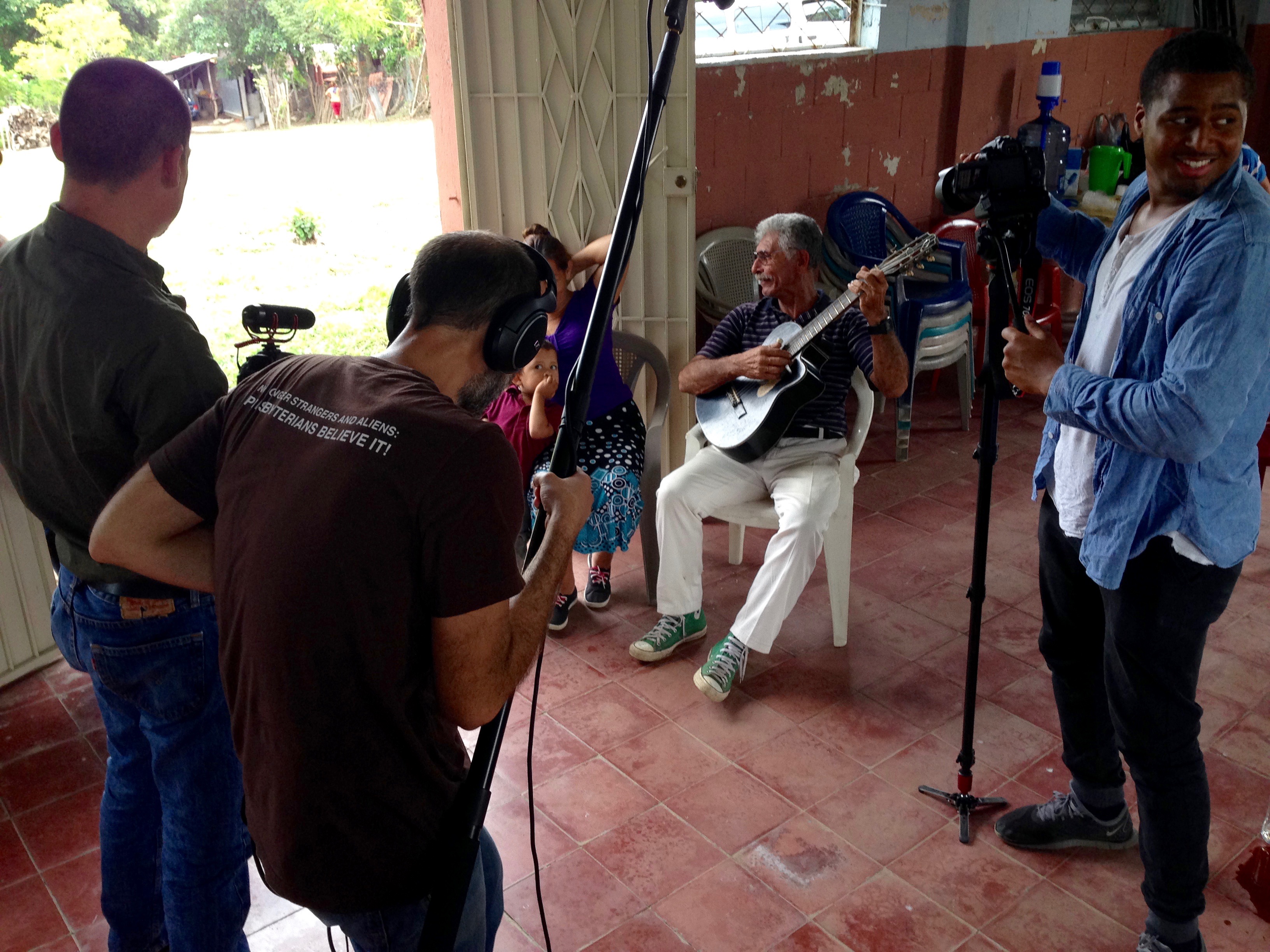A letter from Tracey King-Ortega regional liaison for Central America, based in Nicaragua
December 2016
Write to Tracey King-Ortega
Individuals: Give online to E200518 for Tracey King-Ortega’s sending and support
Congregations: Give to D507539 for Tracey King-Ortega’s sending and support
Churches are asked to send donations through your congregation’s normal receiving site (this is usually your presbytery).
Migration is on my mind. Last month I had the honor and privilege of hosting a videography team from the PC(USA)’s Office of the General Assembly in El Salvador as part of a three-country tour designed to gather interviews and footage to produce a video that will help explain the push factors for migration from Central America.
Living in the region, when I hear about the migration surge that is happening, particularly from Honduras, El Salvador and Guatemala, I immediately think about the many reasons why people would make this difficult decision to take the harrowing journey north. But I’m told that in the U.S. the story of these migrants starts at the border. The news reports that tens of thousands of unaccompanied minors, or mothers with small children and now fathers with small children have crossed the border illegally. We are told that there is an immigration crisis. People are labeled as “illegal.” Resentment is built against “those people” and we never really ask why this is happening and how we should be responding.
In the five days the team was in El Salvador, I was floored by the powerful testimonies and trying reality that these people are living day in and day out. Everywhere we turned there was a story, a story of desperation, of poverty, of violence, of insecurity. The origins of the current context have deep roots in a history of conflict and violence, intricately tied with our own nation’s foreign policy decisions. But today we forget about that past because we are privileged and can shift focus depending on our Facebook feed.I hear the criticism that labels these migrants as “illegal.” That disallows any rights to them because they didn’t follow the rules. I get it, but when I hear the heart-wrenching stories of migrants in juxtaposition to this condemnation; I am pushed to wrestle with my own privilege that has allowed me to always follow the rules. I follow the rules, why don’t they? My privilege makes it easy for me to question others—dare I say, judge them.
With a U.S. passport I can go wherever I want. When I moved to Nicaragua, I first entered as a tourist, even though I entered with the intention to work. I was given 90 days and traveled in and out of the country enough in my first years that I didn’t have to worry about establishing residency. I did eventually work on my residency, which was a hassle. Fortunately, I have a great lawyer friend who walked me through the process. But even with expert counsel it took months. And for many of my friends here it has taken over a year. Though a frustrating and time-consuming process, it was straightforward enough and the reality was that as a U.S. citizen with resources I am able to come and go as I please, Nicaraguan residency or not.
Moving to Nicaragua was a choice out of privilege, not need. Not threat of death for my family. Not because I wasn’t sure where our next meal was coming from. I’ve never experienced that kind of vulnerability. I am privileged for so many reasons. So who am I to quickly judge the “illegal” act of crossing the border without trying to understand it?
For many in places like El Salvador, the air they breathe is tainted with the threat of violence from all sides. I’ve read many articles trying to explain the violence of this country, but it is hard to really understand what it looks or feels like. And then, on this visit to El Salvador, it became incredibly real. We received a phone call while out to eat on Friday night informing us that one of the families that we were to interview on Saturday had been killed. Three people gone. Dead. Wisely, we cancelled our visit to this semi-rural community that is wrought with territorial battles of two rival gangs as well as narco- and human-trafficking. It wouldn’t be safe for us to go because we were told that there is always a revenge killing in situations like this one. Which means in that particular community they would then be on edge, waiting to see who’s next. Again, our privilege keeps us safe, yet to the local people, there is no safe refuge. Coming that close to violent death, I began to understand the concept of “founded fear.” This is their reality; who wouldn’t want something else? If not for themselves, at least for their children.
What we don’t hear in the news stories that talk about illegal immigration is that in fact our laws do allow for those fleeing death to seek safety and security within our borders. But in order for us to honor those laws, we need to understand why they are choosing to make the dangerous trek north. If we are quick to label them by what we are told is the “illegal” act of crossing a border, without understanding that they are refugees seeking asylum, running from real threats and trauma-inducing realities, then we are potentially condemning them to death.
It is true that our government has set up mechanisms for some of these youth to go north legally without having to make the treacherous journey. But the reality is that these opportunities are extremely limited and not nearly agile enough for those living with a pressing threat of violence.
Once we’ve struggled to understand, what then should we do? Indeed, we need to be supporting initiatives that will transform life in El Salvador, Honduras and Guatemala. The people love their countries and don’t want to have to leave. They don’t want their families to be separated. As Presbyterian World Mission we have church partners in each of these countries dedicated to improving conditions for those on the margins of the margins. Take this opportunity to learn how you can support and partner with them.
We also need to find ways to accompany those who are leaving or have left. Regardless of their legal status, my Christian faith comes with clear guidelines. All throughout scripture we are told to welcome the stranger and care for the marginalized.
As I look around my denomination, I am encouraged by what we are doing. We have an office on immigration that not only provides some legal counsel to migrants, but also is developing resources to raise awareness and sensitivity to issues surrounding immigration. Check out this video they produced to learn about how our government is currently treating these migrant families seeking refuge within our borders: http://oga.pcusa.org/section/mid-council-ministries/immigration/family-detention/
My home presbytery, the Presbytery of the Pacific, in response to the surge of unaccompanied minors crossing the border, began organizing ecumenically to respond to the needs of these youth who are being placed in the county of Los Angeles. They have come up with numerous ways that individuals and churches can make a difference in the lives of these kids. See https://www.pacificpresbytery.org/resources/missions/unaccompanied-minors-how-to-help/
I know of other congregations and presbyteries that are also finding ways to accompany migrants in their communities. I am proud to be Presbyterian, believing that God calls us to do justice and love mercy and knowing that there are concrete ways this is being carried out by our membership. If you are moved to do so, I encourage you to find ways to welcome and support migrants where you live. Try to learn about their story, understand what brought them to a new land.
And when the video produced from this trip to El Salvador, Guatemala and Mexico is out, I’ll be sure to promote it far and wide. I want to thank you for your ongoing support, which allows me to be part of God’s enlightening and transforming mission like this one.
Blessings and peace,
Tracey
“Long ago I gave these commands to my people: ‘You must see that justice is done, and must show kindness and mercy to one another. Do not oppress widows, orphans, foreigners who live among you, or anyone else in need” (Zechariah 7:9-10).
Please read this important message from Tony De La Rosa, Interim Executive Director, Presbyterian Church (U.S.A.)
“Do not fear, for I have redeemed you; I have called you by name, you are mine.
When you pass through the waters, I will be with you; and through the rivers, they shall not overwhelm you;
when you walk through fire you shall not be burned, and the flame shall not consume you. (Isaiah 43:1b-2, NRSV)
Dear Friend of the Presbyterian Mission Agency:
Thank you for your prayers and for your financial support of Tracey King-Ortega this year, and any previous year. We hear from our mission co-workers how much your prayerful financial support has meant to them. Please know that you are a vital part of ministries throughout Nicaragua.
Even as I thank you, I want to let you know that this is a critical time for our congregations and all people of faith to commit themselves to support mission co-workers like Tracey. Our global church partners greatly value her service, and you well know how important this ministry is in building connections between the body of Christ in the U.S. and Nicaragua.
We have historically relied on endowment interest and the general offering from congregations to sustain the vital work of all of our mission workers. Those sources of funding have greatly diminished. It is only through the gifts of individuals and congregations that we are able to keep Tracey doing the life-giving work God called her to do. A year ago, in May 2015, we had to recall some mission workers due to a lack of funding. World Mission communicated the challenge to you, and you responded decisively and generously. Through your response, we heard the Spirit remind us, “Fear not!”
Today, I’m asking you to consider an additional gift for this year, and to increase the gift you may consider for 2017. Sending and support costs include not only salary but also health insurance and retirement contributions, orientation, language training, housing, travel to the country of service, children’s education, emergency evacuation costs, and visa/passport costs.
My heartfelt thanks for your prayers and support of our Presbyterian mission co-workers. In the coming season, we will celebrate God’s sending of the Christ child, the source of the good news we share. May you experience anew the hope, peace, joy, and love that are ours because “perfect love casts out fear” (I John 4:18).
Thank you for saying “yes” to love.
With you in Christ,
Tony De La Rosa
Interim Executive Director, Presbyterian Church (U.S.A.)
![]() You may freely reuse and distribute this article in its entirety for non-commercial purposes in any medium. Please include author attribution, photography credits, and a link to the original article. This work is licensed under a Creative Commons Attribution-NonCommercial-NoDeratives 4.0 International License.
You may freely reuse and distribute this article in its entirety for non-commercial purposes in any medium. Please include author attribution, photography credits, and a link to the original article. This work is licensed under a Creative Commons Attribution-NonCommercial-NoDeratives 4.0 International License.

